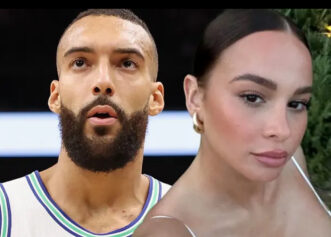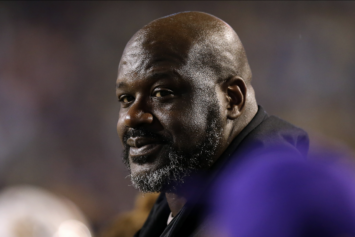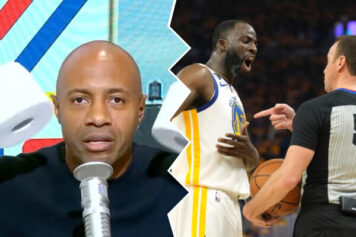Rapper Bobby Schmurda and Milwaukee Bucks rookie Jabari Parker live in two parallel universes but on very opposite ends of the cultural spectrum.
Schmurda rose from Vine Sensation—when he spit his low-quality “Hot N*gga” single, in which he does the infamous “Schmoney Dance” over a free internet beat—to being signed by Sha Money XL and then landing a record deal with Epic Records at a time when it’s probably harder to get a major label deal than it is to get a gun into the White House.
The 20-year-old Shmurda, whose real name is Ackquille Pollard, became an overnight sensation; the epitome of a one-hit wonder and a sign of the times as Internet popularity dictates the cash flow of record labels struggling to stay relevant in a global and plentiful “free” hip-hop scene.
Schmurda is the equivalent of a baby in the game. He started rapping at age 10 and this year his song peaked at 6 on the Billboard Hot 100 and the industry showed much respect as the song was remixed and performed by a plethora of artists including Lil Kim', French Montana and Juicy J.
The "Hot N*gga" video posted on YouTube in August has been viewed tens of millions of times, and Pollard performed the song for a national television audience this month on ABC's "Jimmy Kimmel Live."
"My music is straight facts," Pollard recently told New York Magazine. "There are a lot of gangsters in my 'hood.'"
With one hot joint and some social media love, he flipped a hardnock Brooklyn Zoo life into mainstream fame and a future bright with limitless potential.
In similar rising comet fashion, as a 6-foot-1 fifth-grade guard, Parker had five D-1 scholarship offers. The 19-year-old Parker was taken with the second overall pick in the 2014 NBA Draft after one season in Durham, N.C.
In 25 games this season, the former Duke Blue Devil averaged 12.3 points (2nd among rookies) and 5.5 rebounds (3rd) in 29.5 minutes per game (3rd) while helping the Bucks to a 13-12 record. He scored in double figures 17 times, including a career-best 23 points at BK on Nov. 19—the highest-scoring game by a Bucks teenager in franchise history.
Schmurda and Parker were raised in contrasting parental environments and undoubtedly taught different values by their parents. Parker’s dad embraced everything that was golden about his Southside Chicago hood and ran a recreational sports organization for kids. That’s where Jabari and his brother Christian developed a passion for the rock and the rim.
While Schmurda’s pops was incarcerated and he grew up raised by the violent, criminal and influential street culture, Parker’s street corner was the Basketball court at his local LDS Church meetinghouse in the Hyde Park community area, where he balled in order to avoid the hazards of urban playgrounds. Parker is also a member of The Church of Jesus Christ of Latter-day Saints and the son of former NBA player Sonny Parker.
The two youngsters flex totally different styles, but are in the same position as far as being “next up.” One kid has big dreams but they are little in scope. He wants to be the reincarnation of Tupac/T.I. Another is quoted as wanting to be an example for black males from Chicago’s infamous Southside.
“Everything in my city is negative,” Parker once said of how he feels his hometown is portrayed in national media . “[The media] try to bring it down so much with the violence and I’m an African-American male in my community…going to college and that’s big time. I want to represent them in the best form, the best manner just to keep them close to my heart so they can see that there’s a young [guy] out on the South Side doing big things.”
Both of these guys were getting ready to embark on a legit journey for complete domination of their respective crafts, but the wheels of fate are shifty and cruel. The future of a rising star can get washed away in the blink of an eye and with the force of a Tsunami's rolling waves.
Jabari Parker suffered a left knee injury during the third quarter of Monday night’s game in Phoenix. He returned to Milwaukee to undergo an MRI that revealed a torn anterior cruciate ligament (ACL). The team was first reporting it as a sprained knee, but Parker will undergo surgery and his season is a wrap. It’s a sadly premature ending to what was shaping up to be a Rookie of the Year season for young Parker and an upswing Bucks squad.
Shmurda, who has had his share of run-ins with the law, was arrested Tuesday night during a sting involving multiple shootings and drug trafficking in New York City. He was ironically taken into custody by investigators as he sat in his car outside Quad Recording Studios on Seventh Avenue—the same studio that Tupac got blasted in back in 1994.
The indictment is sealed and the specific charges have not been disclosed, but we know it's part of a long-term investigation conducted by the NYPD and a special narcotics prosecutor and instead of preparing for his shot at the big-time, the Brooklyn-born rapper's career is in limbo. He’s facing some serious accusations that can lead to prison time and cut a career shorter than Midget Mac doing the limbo.
Law enforcement sources tell us Shmurda was under surveillance by police. It seems the hip-hop cops are still alive and well in the Rotten Apple. He is scheduled to be arraigned and formally charged today. More than 12 others have been arrested as part of the investigation .
Two rising rockets struck down in one week. One by his own stupidity and ego and another by circumstance. Both rocked the social media monitor and Twitter and Facebook has exploded with commentary on the rise and temporary fall of both torch-carriers. Knee injuries are as part of the NBA culture as dunks and free throws. Getting arrested and stunting the growth of a potentially-lucrative career is a common pitfall for rappers of all ages these days.
In both instances, it hurts a bit more when the person suffering the loss is a caterpillar. A vibrant symbol of the future. Older heads didn’t care for Bobby Schmurda’s complete lyrical package, but nonetheless they were all bopping their heads to the song and able to embrace the thug-popiness of “Hot N*gga.”
I mean, the "Schmoney Dance" looks like a combination of the 80s-famous “Wop” and “Smurf” dances. I give Bobby some credit. He drove his PR campaign like Earnhardt in the last lap of the Indy 500. Problem is he forgot to step off the pedal when he got off the stage.
Parker has a better chance of recovering from his injury and continuing the journey. It’s physical and he doesn’t face any ramifications other than the potential long-term effects of the injury itself. ACL’s affect players differently. Sometimes they can come back and look like Russell “I haven’t lost a step” Westbrook. Other times they become susceptible to another injury and are never the same. Either way, two young brothers lost a bit of their shine this week and how they rebound will determine what side of tragedy's row they happen to fall on.
Premature Evacuation
The recent trials and tribulations of former MVP Derrick Rose and Milwaukee Bucks rookie Jabari Parker’s sad circumstance on Monday night had TSL thinking about a few NBA cats that suffered injuries early and never got to really get their shit off in The Show.
GREG ODEN: Oden was considered a “once-in-a-decade player” coming out of Ohio State. He was tabbed the next dominating center and carried Patrick Ewing expectations when the 7-footer entered the NBA. But his career began with microfracture surgery on his right knee in September of 2007.
In Bill Walton –like fashion, he showed brief flashes of his potential at times. A 24-point and 15-rebound night against Milwaukee was a performance fit for framing, but more knee injuries followed and Oden is yet to make it through an entire NBA season.
At most, he is an intimidating yet sad figure sitting on some team’s bench, hoping for a couple of minutes of action but never impacting the game like everyone knew he could.
JAY WILLIAMS: Williams went to Duke, became a college legend, and won the John R. Wooden award, the Oscar Robertson Trophy and the Naismith College Player of the Year award. The Chicago Bulls drafted him second overall in the 2002 Draft and in 2003, Williams was involved in a foul motorcycle accident. He broke his leg and shattered his pelvis. Adding insult to injury is the fact that contractually he wasn’t supposed to be riding the bike and that showed a lack in judgment that cost him millions and a bright career as well.
The Bulls ended up releasing him from his contract shortly after news broke that Williams might not be able to play basketball ever again. His lasting impression in the basketball world will undoubtedly be as an ESPN analyst.
DANNY MANNING: He was a beast in college. One of the 10 greatest college players I’ve ever seen. He led Larry Brown’s 1988 Kansas Jayhawks to a chip over a loaded and legendary Oklahoma squad. With high expectations, he became a No. 1 draft pick, but injuries cramped the 6-10 baller's steez for the majority of his career.
He tore his ACL in his rookie year, and went through a series of nagging knee injuries for the remainder of his career. Manning was able to scrounge up some decent seasons in 1992-1994, but he was never able to play through a full season for the rest of his time in the NBA.
PENNY HARDAWAY: Penny Hardaway had a lengthy career, but after suffering a devastating knee injury and missing the majority of the 1997-1998 season, he was never the same and he never really got a chance to enter his prime at full physical capacity.
He hit the scene like a multi-faceted lightning bolt with Penny Doll commercials and quickly became a face of the NBA drawing comparisons to Magic Johnson. He showed glimpses of his magical skills when he partnered with Shaq and went to the NBA Finals, but after he wrecked his knee he never played an 82-game season again.
MAURICE STOKES: Maurice Stokes' career came to one of the most tragic endings that the NBA has ever witnessed. For his career, which lasted only three seasons, Stokes averaged 16.4 points and a beast- mode 17.3 rebounds per game. He was on the verge of changing the game, but in the final game of the 1957-1958 season, Stokes was fouled while attempting a layup. He fell to the ground and struck his head, immediately losing consciousness. A couple of days after his accident, Stokes had a seizure and went into a coma, and was diagnosed with post traumatic encephalopathy. His motor skills diminished rapidly, and he became paralyzed. Maurice Stokes died 12 years later at the age of 36, never getting his chance to team up with Oscar Robertson.
Bobby Hurley: Hurley rose under his father’s direction at the famed St. Anthony HS in New Jersey to a career at Duke University that saw him lead the Blue Devils to back-to-back national championships, setting the stage for a dope career. In an era when floor general’s began transitioning into the Chef Curry-like combo guards we see in abundance today, Hurley remained the "point guards point guard." His leadership, city grit and fundamental comprehension of the game were unrivaled. However, Hurley, was involved in a near-fatal car accident during his rookie season, which wrecked his body and his dreams of becoming an NBA star.



